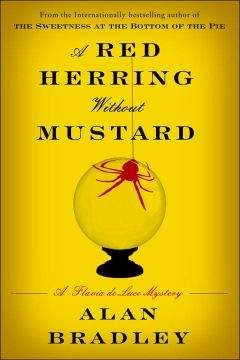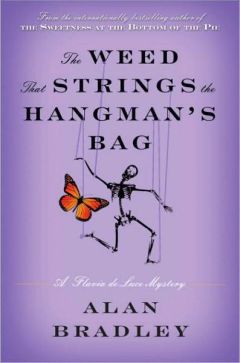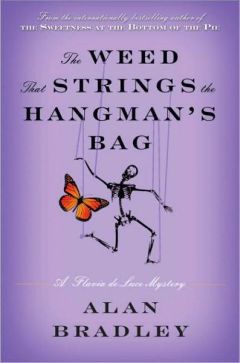Alan Bradley - A Red Herring Without Mustard: A Flavia de Luce Novel

Скачивание начинается... Если скачивание не началось автоматически, пожалуйста нажмите на эту ссылку.
Жалоба
Напишите нам, и мы в срочном порядке примем меры.
Описание книги "A Red Herring Without Mustard: A Flavia de Luce Novel"
Описание и краткое содержание "A Red Herring Without Mustard: A Flavia de Luce Novel" читать бесплатно онлайн.
She couldn’t possibly have learned of the Bull baby’s supposed abduction until later—she had been gone from the Gully before the bungled baptism began.
Mrs. Bull, to reinforce her lie, must have been forced to follow through by filing a false report with the police. Tom, because of his shady associations, must have managed to keep well in the background. Hadn’t Mrs. Mullet let slip that he’d had his troubles with the law?
How I wished I could ask the Inspector to confirm my conjecture—especially the part about Tom Bull—but I knew he wouldn’t—couldn’t—tell me. Perhaps some other time …
At any rate, Fenella had almost certainly been tracked down and questioned by the authorities during their investigation of the missing child—tracked down, questioned, and cleared. That much seemed obvious.
So that when Mrs. Bull had wandered unexpectedly into her tent just last week at the fête, it must have seemed as if Fate had sent her there for justice.
“There’s something buried in your past. Something that wants digging out … wants setting right,” Fenella had told her, but it was not the baby she meant—it was Mrs. Bull’s accusation of kidnapping!
“Revenge is my specialty,” Fenella had said.
Revenge indeed!
But not without cost.
Surely the woman had recognized Fenella’s caravan at the fête? Whatever could have possessed her to enter the tent?
I could think of only one reason: guilt.
Perhaps, in her own mind, Mrs. Bull’s lie to her husband and the police was beginning to come unraveled—perhaps in some odd way she believed that a fresh confrontation would deflect any growing suspicion, on Tom’s part, of her own guilt.
What was it Dr. Darby had told me? “People can behave very strangely in times of great stress.”
“Well?” the Inspector said, interrupting my thoughts. He was waiting for me to go on.
“Well, Mrs. Bull, of course, assumed that Fenella had looked into the crystal ball and seen the drowning. She must have gone home straightaway and told her husband that the Gypsy who had taken their baby was again camped at the Palings. Tom went to the caravan that very night and tried to kill her.
“He still believes his wife’s lie, most likely,” I added. “Even though the baby’s body has since been found, I’ll bet he’s still blaming it on the Gypsies.”
I glanced over at Sergeant Graves for confirmation, but his face was a study in stone.
“How can you be so sure he was at the caravan?” Inspector Hewitt asked, turning to a new page of his notebook.
“Because Colin Prout saw him there. And as if that weren’t enough, there was that whole business about the smell of fish,” I said. “I think you’ll find that Tom Bull has a disease that causes his body to exude a fishy odor. Dogger says that a number of such cases have been recorded.”
Inspector Hewitt’s eyebrows went up slightly, but he said nothing.
“That’s why, as it’s grown worse, he’s kept to his house for the past year or more. Mrs. Bull put about the story that he’d gone away, but he’d all the while been right here in Bishop’s Lacey, working after dark. He’s a foundryman, you know, and probably quite handy at melting down scrap iron and molding it into antiques.”
“Yes,” Inspector Hewitt said, surprising me. “It’s no secret that he was once employed at Sampson’s works, in East Finching.”
“And still is,” I suggested. “At least after dark.”
Inspector Hewitt closed his notebook and got to his feet.
“I’m very pleased to tell you, Colonel, that your firedogs will soon be restored. We found them in the coach house where Harewood kept his antiques.”
I was right! The Sally Fox and Shoppo at Brookie’s had been Harriet’s! Having replaced them with reproductions, Brookie was just waiting for a chance to sell the originals in London.
“There are others involved in what proved to be a very sophisticated ring of thieves and forgers. I trust that, in due time, you’ll read about it in the newspapers.”
“But what about Miss Mountjoy?” I blurted it out. I felt quite sorry for poor Tilda Mountjoy.
“She may well face charges as an accessory,” the Inspector said. “It’s up to the Chief Constable. I don’t envy him his task.”
“Poor Colin,” I said. “He hasn’t had an easy life, has he?”
“There may be mitigating circumstances,” Inspector Hewitt said. “Beyond that, I can say nothing.”
“I knew for certain he was mixed up in it when I found the rope.”
I regretted it as soon as the words were out of my mouth.
“Rope? What rope?”
“The rope that fell through the grating at the Poseidon fountain.”
“Woolmer? Graves? What do we know about this?”
“Nothing, sir,” they said in unison.
“Then perhaps you will favor us by taking yourselves to the fountain immediately and rectifying the oversight.”
“Yes, sir,” they said, and marched, red-faced, from the drawing room.
The Inspector again focused his fierce attention on me. “The rope,” he said. “Tell me about the rope.”
“There had to be one,” I explained. “Brookie was far too heavy to be hoisted onto the fountain by anyone but the strongest man. Or a Boy Scout with a rope.”
“Thank you,” Inspector Hewitt said. “That will do. I’m quite sure we can fill in the blanks.”
“Besides,” I added, “the rubbed spot on the trident showed quite clearly where the rope had polished away the tarnish.”
“Thank you. I believe we’ve already noted that.”
Well, then, I thought, you’ve no one to blame but yourselves if you didn’t think of looking for the rope that caused it. Colin is a Boy Scout, for heaven’s sake. There were times when officialdom was beyond even me.
“One last point,” the Inspector said, rubbing his nose. “Perhaps you’d be good enough to clear up one small question that has rather eluded me.”
“I’ll do my best, Inspector,” I said.
“Why on earth did Colin hang Brookie from the fountain? Why not leave him where he was?”
“They had struggled for the lobster pick inside the base of the fountain. When Colin let go of the thing suddenly, Brookie’s own force caused him to stab himself in the nostril. It was an accident, of course.”
Although this was the way Colin had told it to me, I must confess to gilding the lily more than a little for the Inspector’s benefit. I no more believed Colin’s version of the story than I believed that dray horses can fly. Brookie’s death, in my estimation, was Colin’s revenge for years of abuse. It was murder, pure and simple.
But who was I to judge? I had no intention of adding so much as another ounce to the burden of Colin’s troubles.
“Brookie fell backwards down the stone steps into the chamber. That’s probably what actually killed him.”
Oh Lord, forgive me this one charitable little fib!
“Colin fetched a length of rope from the tunnel and hauled him up onto Poseidon’s trident. He had to tie Brookie’s wrists together so that the arms wouldn’t slip out of the coat later. He didn’t want to risk the body falling.”
Inspector Hewitt gave me a look I can only describe as skeptical.
“Brookie,” I went on, “had told Colin about the Hobblers’ belief that Heaven was right there above our heads. You see, he wanted to give Brookie a head start.”
“Good lord!” Father said.
Inspector Hewitt scratched his nose. “Hmmm,” he said. “Seems rather far-fetched.”
“Not so far-fetched at all, Inspector,” I said. “That’s precisely the way Colin explained it to me. I’m sure that when Dr. Darby and the vicar allow you to question him further …”
The Inspector nodded in a sad way, as if he’d rather suspected it all along.
“Thank you, Flavia,” he said, getting to his feet and closing his notebook. “And thank you, Colonel de Luce. You’ve been more than generous in helping us get to the bottom of this matter.” He walked to the drawing-room door.
“Oh, and Flavia,” he said rather shyly, turning back. “I almost forgot. I came here today somewhat as a message bearer. My wife, Antigone, would be delighted if you’d come for tea next Wednesday … if you’re free, of course.”
Antigone? Tea? And then it sank in.
Oh, frabjous day! Callooh! Callay! That glorious goddess, Antigone, was summoning me, Flavia Sabina de Luce, to her vine-covered cottage!
“Thank you, Inspector,” I said primly. “I shall consult my calendar and see if I can set aside some time.”
Up the stairs I flew. I couldn’t wait to tell Porcelain!
I should have guessed that she’d be gone.
She had torn a blank page from my notebook and fastened it to one of my pillows with a safety pin.
Thanks for everything. Look me up in London sometime.
Your friend, Porcelain
Just that, and nothing more.
At first I was seized with sadness. In spite of our ups and downs, I had never met anyone quite like Porcelain Lee. I had already begun to miss her.
I find it difficult to write about the portrait of Harriet.
Leaving the painting at Vanetta Harewood’s studio with its face against the wall was out of the question. She had, after all, offered it to me, and since Harriet had paid in full for the work, it belonged rightly to her estate at Buckshaw.
I would hang it secretly, I decided, in the drawing room. I would unveil it for my family with as much ceremony as I could muster. I could hardly wait.
In the end, it hadn’t been terribly difficult to arrange the transfer. I’d asked Mrs. Mullet to have a word with Clarence Mundy, who operated Bishop’s Lacey’s only taxicab, and Clarence had agreed to “lay on transportation,” as he put it.
On a dark and rainy afternoon in late September, we had rolled up at the gate of the cottage studio in Malden Fenwick, and Clarence had walked me to the door with an oversized black umbrella.
“Come in,” Vanetta Harewood said, “I’ve been expecting you.”
“Sorry we’re a bit late,” I said. “The rain, and so forth …”
“It’s no trouble at all,” she replied. “To be truthful, I’ve been finding the days rather longer than usual.”
Clarence and I waited in the hall until the glowering Ursula appeared with a large object, wrapped in brown paper.
“Keep it dry,” Vanetta said. “It’s my best work.”
And so we brought Harriet’s portrait to Buckshaw.
“Hold the umbrella for me,” Clarence said, preparing to wrestle the package from the backseat of the taxicab. “I’m going to need both hands.”
Shielding the parcel from the slanting rain, we dashed to the door, as awkward as three-legged racers.
I had handed Clarence the fare and was halfway across the foyer when suddenly Father emerged from his study.
“What have you dragged home now?” he asked, and I couldn’t find it in my heart to lie.
“It’s a painting,” I said. “It belongs to you.”
Father leaned it against the wall and returned to his study, from which he emerged with a pair of shears to cut the several turns of butcher’s string.
He let the paper fall away.
That was two weeks ago.
The portrait of Harriet and her three children is no longer in the foyer, nor is it in the drawing room. Until today, I’d searched the house in vain.
But this morning, when I unlocked the door of my laboratory, I found the painting hanging above the mantelpiece.
I’ve mentioned this to no one.
Father knows it’s there and I know it’s there, and for now, that’s all that counts.
NOTE TO THE READER
In order to provide sufficiently dramatic lighting for this story, I must admit to having tinkered slightly here and there with the phases of the moon, though the reader may rest assured that, having finished, I’ve put everything back exactly as it was.
ACKNOWLEDGMENTS
The writing of a book is, among many other things, an extended journey with friends: a kind of pilgrimage. Along the way we have met, sometimes parted, shared meals, and swapped stories, ideas, jokes, and opinions. In doing so, these friends have become inextricably woven into the book’s fabric.
My heartfelt gratitude to Dr. John Harland and Janet Harland, to whom this book is dedicated, for many years of friendship and countless excellent suggestions.
To Nora and Don Ivey, who not only opened their home to me, but also saw to it personally that one of my lifelong dreams was made to come true.
To my editors: Bill Massey at Orion Books in London, Kate Miciak at Random House in New York, and Kristin Cochrane at Doubleday Canada in Toronto. And particular thanks to Loren Noveck and Connie Munro, at Random House, New York, my production editor and copy editor respectively, who toil away quietly behind the scenes doing much of the work for which I get the credit.
To Denise Bukowski, my agent, and Susan Morris at the Bukowski Agency, who fearlessly juggle all the mountains of detail with astonishing efficiency.
To Brad Martin, CEO of Random House Canada, for his abiding faith.
To Susan Corcoran and Kelle Ruden of Random House, New York, and Sharon Klein of Random House, Toronto, for their phenomenal support.
To Natalie Braine, Jade Chandler, Juliet Ewers, Jessica Purdue, and Helen Richardson of Orion Books, London, who have relieved me of so much of the worry.
To Jennifer Herman and Michael Ball for making the miles fly by and delivering me safely.
To Ken Boichuk and his Grimsby Author Series, with gratitude for a most memorable evening.
To my old friend Robert Nielsen of Potlatch Publications, who published some of my earliest fiction, and who honestly seemed as happy to see me again as I was to see him.
To Ted Barris, author and longtime friend, whose focused energy is always such an inspiration.
To Marion Misters of Sleuth of Baker Street in Toronto, and Wendy Sharko of The Avid Reader in Cobourg, who welcomed me back to my birthplace and hometown respectively.
To Rita and Hank Schaeffer, who coddled me in Montreal.
To Andreas Kessaris of the Paragraphe Bookstore, Montreal.
To the Random House “Ladies of Westminster”: Cheryl Kelly, Lori Zook, Sherri Drechsler, Pam Kaufman, Judy Pohlhaus, Camille Marchi, Sherry Virtz, Stacey Carlinia, Emily Bates, Amiee Wingfield, and Lauren Gromlowicz, with whom I shared a ton of books and two tons of laughs.
To Kim Monahan, Randall Klein, and David Weller of Random House, in New York City.
To Tony Borg, Mary Rose Grima, Dr. Joe Rapa, Doris Vella, and Dr. Raymond Xerri, who will probably never realize what a great difference they made. Their many kindnesses and courtesies during the writing of this book will never be forgotten.
To Mary Jo Anderson, Stan Ascher, Andrea Baillie, Tim Belford, Rebecca Brayton, Arlene Bynon, Stephen Clare, Richard Davies, Anne Lagace Dowson, Mike Duncan, Vanessa Gates, Kathleen Hay, Andrew Krystal, Sheryl MacKay, Hubert O’Hearn, Mark Perzel, David Peterson, Ric Peterson, Craig Rintoul, M. J. “Mike” Stone, Scott Walker, Lisa Winston, and Carolyn Yates, who made it seem easy by asking all the right questions.
Подписывайтесь на наши страницы в социальных сетях.
Будьте в курсе последних книжных новинок, комментируйте, обсуждайте. Мы ждём Вас!
Похожие книги на "A Red Herring Without Mustard: A Flavia de Luce Novel"
Книги похожие на "A Red Herring Without Mustard: A Flavia de Luce Novel" читать онлайн или скачать бесплатно полные версии.
Мы рекомендуем Вам зарегистрироваться либо войти на сайт под своим именем.
Отзывы о "Alan Bradley - A Red Herring Without Mustard: A Flavia de Luce Novel"
Отзывы читателей о книге "A Red Herring Without Mustard: A Flavia de Luce Novel", комментарии и мнения людей о произведении.






